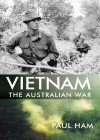Vietnam: The Australian War
Written by: Paul Ham,
HarperCollins, Sydney, 2007,
ISBN: 9780732282370, 813 pp.
Reviewed by: Brigadier John Essex-Clark (Retd)
The Australian reading public have been presented over the past few years with books about Australia’s military history. Paul Ham, who previously authored Kokoda, has now contributed again with another blockbuster and tour de force in Vietnam. Like his previous book, this is a weighty tome, figuratively and literally, with 813 punchy pages including adequate maps and illustrations. It covers all the significant matters of Australia’s involvement in the war, from ‘go to whoa’, in a well-balanced, comprehensive and challenging style.
Ham’s facts have been thoroughly researched and he narrates them with crisp, direct and convincing words. The highlights of the war itself and the reasons for Australia’s commitment are clearly described. The book narrates with balance the duped and the duplicitous, the brave and the cowardly, the wise and the stupid; the politician, the protester and the conscientious objector—the politically inspired angst and opposition is well-preserved for history. It describes the various attitudes to the war of the United States, the North and South Vietnamese, and the Australians, both soldier and civilian. The antics of the world and Australian media—compared with the efforts of the Australian soldiers and their principal leaders—are spotlighted and analysed. The bigger and more significant battles are adequately described from the viewpoint of those who fought or were embroiled in them, including civilians. His discussions with the enemy commanders and soldiers opposing the Australians in Phuoc Tuy Province, whether Viet Cong or North Vietnamese Army, are surprisingly revealing and illuminating, as are the vicious action of the communist cadres to control the civilian population.
History is based on the memories and writings of the participants, and Ham’s descriptions reflect this; yet he is not afraid to challenge the opinions of many of the earlier pundits. Not all will agree with Ham’s interpretations or perceptions about the thoughts or the actions of the principal actors in the story, but all will agree they should be scrutinised. Ham seeks the full truth in all the myths that abound about Vietnam, and he probably gets nearer than most. Some might disagree, however, with the significance to the Australian involvement that Ham gives to such notables as Colonel Ted Serong.
The aftermath of the war within the Australian community is shown—from the hatred displayed toward many returning Vietnam veterans, right through to the finally ameliorating Welcome Home Parade in Sydney in 1987. Not avoided are the attempts to diminish their unconscionable anti-soldier action by embarrassed politicians and their acolytes, nor the shocking effects of PTSD on some of the Australian participants. Ham also makes telling points about the attitudes and lack of remorse by anti-war protagonists. His comments about the media are sure to stir a hornet’s nest of controversy by the lazy and arrogant of that profession. Ham also brilliantly describes the thoughts and reactions of the Australian soldier. He recalls the time-hackneyed abuse of the soldier by the civilian, and quotes Graham Greene’s ‘... to the soldier the civilian is the man who employs him to kill, who includes the guilt of murder in the pay envelope and escapes responsibility.’
Ham does not attempt to compete with the dry and very comprehensive official military history books, To Long Tan and On the Offensive, published by the Australian War Memorial, or the plethora of ‘battle’ books, or the historically based and dramatised fiction novels. This is not just military history but a significant part of the history of our nation. It is the story of the war from an Australian perspective and Ham’s narrative is brutally thought-provoking and hugely informative.
The Australian Digger in Vietnam, in Ham’s perception, was a fine exemplar of the average Australian male at that time: courageous, spirited, fair, loyal, humane, and well-balanced, as is this book.
In time, Ham’s Vietnam: The Australian War may well become the average reader and history student’s textbook on the Vietnam War.

